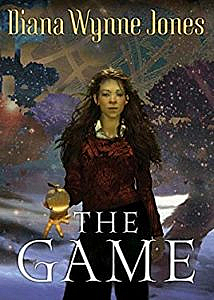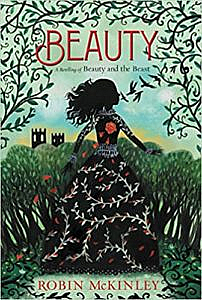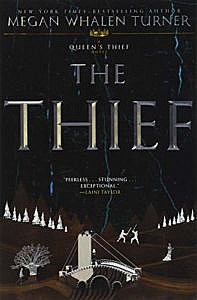World mythologies and regional folktales have always served as source material for modern fantasy, with some (like Greek or Celtic myths) having well-established influence and others (like African or Asian tales) enjoying their first widespread audience in recent years. Young adult novels have their fair share of fantasies based on the old stories, and also their fair share of both successful and failed retellings. In the last year or two, young adult readers have been offered a fresh batch of works based on the Greek lore, much of it incorporating Modern Values like Diversity, Inclusivity, and Equal Representation (all hail). Given that their resulting quality tends to be mediocre at best, I suggest three older YA titles based on Greek stories that are worth real time, thought, and attention.

The Game, by Diana Wynne Jones
The Game focuses on a protagonist named Hayley, whose grandparents send her to live with a house full of aunts and cousins she has never met before. As she and her cousins play forbidden games in the “mythosphere,” a realm where all the world’s stories and their characters can be found, Hayley gradually comes to realize that the majority of her family is threatened by the forbidding Uncle Jolyon, who is on the verge of upsetting the balance of the entire cosmos through his greed for power. With the help of her cousins and two mysterious characters named Flute and Fiddle, Hayley must find a way to stop him, and discovers who she is in the process.
The story is populated by thinly disguised Olympian gods and goddesses, and there are nods to other mythologies throughout the story as well. Jones is a delightful writer, capable of painting vivid scenes and strong, sympathetic characters. This is a very short book, more of a novella, so the plot is fairly compressed and speedy. The idea of the Mythosphere is creative, and feels like a treasure hunt for a well-read audience; one of the pleasures of the book is to find other stories you recognize in her references.
As fun and well-told as this little adventure is, there are some elements for Christian readers to be aware of. Jones was a decided atheist, and the book takes an evolutionary foundation for granted; “good” and “bad” are balanced evenly in the story, with the villain’s great sin being a desire to upset that balance. He does that by removing other characters’ ability to make their own choices – personal choice and individual moral responsibility are themes Jones wrestles with in many of her books, and this is no exception. At the end of the story, characters revel in their newfound freedom to do whatever they like, which is what will shape the world and maintain balance, for better or for worse. Jones sets up a situation where the alternatives are to either have the freedom to choose or reject darkness, or to have the darkness thrust upon you by force; she does not present (presumably because she has not herself known) an idea of inexorable goodness or grace to match it.

Beauty, by Robin McKinley
This is McKinley’s first retelling of Beauty and the Beast, which (along with many other fairy tales the world over) owes much of its content to the Greek myth of Cupid and Psyche. McKinley’s writing feels friendly and warm, treating magic and enchantments with a sort of down-to-earth practicality that makes it convincing and amiable. As her first novel, Beauty lacks some of the skilled character development and consistency found in her later works, but she puts enough twists into the original story to keep it fresh and entertaining.
In this retelling, the protagonist’s given name is Honor, and Beauty is an ironic nickname bestowed in the face of adolescent awkwardness. For all her professed disappointment in her given name, she is nevertheless occupied for much of the story in living up to it; honor and duty compel much of her actions and are the only virtues that will redeem the Beast, who came into his state through dishonorable choices. As Beauty adheres more and more closely to honor in the face of temptation and sorrow, she also becomes more lovely, until in the end she restores both humanity and dignity to the Beast.
The major flaw in the story is the one common to both the fairy tale and the original myth: the problem of the monstrous bridegroom. Cupid is a husband haunted by his jealous mother, and the Beast is a cursed lover who must be rescued by his bride; although redemption is eventually accomplished in both stories, the typology leaves something to be desired.

The Thief, by Megan Whalen Turner
The Thief is the first in a series whose central character is Eugenides, a boy who rises from the office of “Queen’s Thief” to King over three neighboring countries (all of which bear striking resemblances to ancient Greece). In this first story, Eugenides is hired as a thief to steal a sacred artifact from an ancient and long-forgotten temple; the ruler presented with this artifact will be secured in his rule by the blessing of the gods (or at least by the people’s belief in it). Gen sets off with a motley crew to retrieve it, but as the story unfolds the reader gradually realizes that he has his own mission, and his own plans to achieve it.
Turner is an excellent writer, and her characters have real force and personality. She manages to create a protagonist who is often irritating and disagreeable, morally questionable, and eminently likeable, and the supporting characters are nearly as complex. Although the first third or so of the plot in this first book drags, the following volumes are increasingly tightly-woven and excellently paced. But Turner’s real talent is a mastery of the unexpected plot twist; in each book, you find that Eugenides has achieved the impossible by some clever and labyrinthine scheme, which upon a second reading you recognize as natural and inevitable following the course of events in the story.
The real tension in this first book is not only accomplished in the quest itself, but in Eugenides’ growing discomfort with his established atheism. He begins the story staunchly believing that worship of any gods, old or new, is superstition, and mocks those who disagree; by the end of the story, he has come to realize that not only are the gods real, they are extremely observant and heavily involved in the minute details of his life. He learns that he is a piece in the plans of divine powers, and that even casual prayers might be answered unexpectedly at any time; his relationship with them only deepens through the course of the series.
Though none of the books in this list are problem-free, all are well-written, engaging, and worth reading thoughtfully and attentively. Of the three, The Thief is my personal favorite, but readers are free to disagree and/or add their own additions and suggestions to supplement the list!


